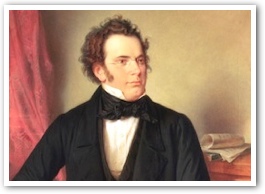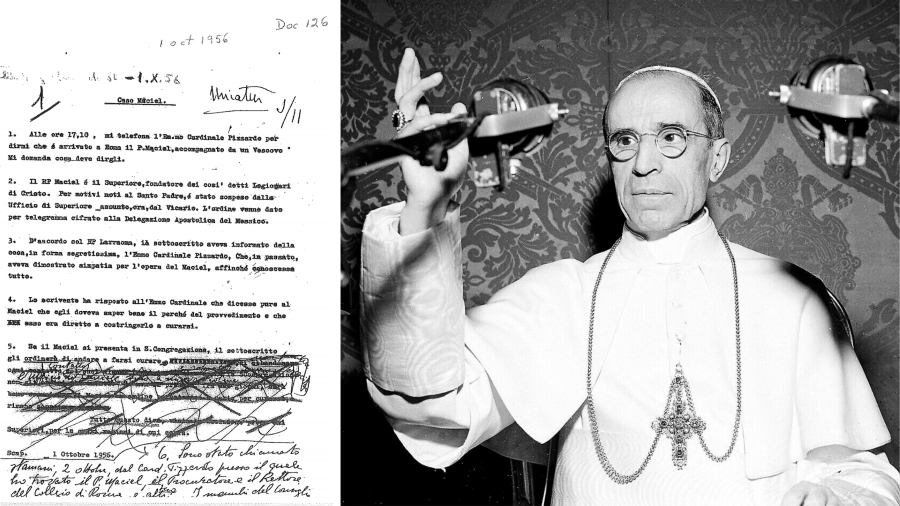The composer’s musical legacy contains more consolation for our loneliness than any other human creation.
By Roger Scruton, Catholic Education Resource Center
 Franz Peter Schubert
Franz Peter Schubert1797-1828
 Franz Schubert excelled in every musical genre, writing string quartets that can be set beside the greatest of Haydn and Mozart, symphonies that stand comparison with Beethoven, and works for piano that paved the way for Schumann and Chopin. His String Quintet in C major is perhaps the most beautiful piece of chamber music ever composed, while his 600 songs represent a flow of unaffected melody without compare in the history of music. He died aged 31 in 1828, leaving nearly 1,000 compositions, nearly all of which are marked by his distinctive genius.
Franz Schubert excelled in every musical genre, writing string quartets that can be set beside the greatest of Haydn and Mozart, symphonies that stand comparison with Beethoven, and works for piano that paved the way for Schumann and Chopin. His String Quintet in C major is perhaps the most beautiful piece of chamber music ever composed, while his 600 songs represent a flow of unaffected melody without compare in the history of music. He died aged 31 in 1828, leaving nearly 1,000 compositions, nearly all of which are marked by his distinctive genius.
The BBC’s Radio 3 has decided to celebrate the 215th anniversary of the year of Schubert’s birth by broadcasting his music for eight days solidly next month. Actually, the 214th or 216th would have been just as good, for Schubert is a composer whom we should celebrate every year and every day. No writer of music is more relevant to us. We live in a world that is on the run. We run towards huge rewards, and we run from huge disasters. Nothing around us stands still; we seek rest but rarely find it. We have lost touch with what matters, which is the poignant sense of being. And that is what Schubert has in abundance. He is the poet of home and the loss of home. Nothing in his songs is contrived: everything flows spontaneously from the situation invoked by the poet, and just as life in all its variety gains shape in his incomparable melodies, so too does death lurk in his shifting harmonies and asymmetrical forms.
For Schubert’s greatest works were written in the shadow of death, which is present in them as in the works of no other composer, save possibly Mahler. In the first movement of the Unfinished Symphony, for example, or in the opening of the great String Quartet in G major, he makes us stare into the void, and does so in a way that is neither morbid nor despairing but strangely enriching, urging us to value the moment not despite its transience but because of it.
Faced with death, Schubert can recall the sweetest of joys, as in the poignant last movement of the last sonata, or in the first movement of the String Quintet in C. His vision is clear, undeceived and frightening; and yet he snatches love and joy from the void that stands ready to engulf them, and the result is as life-affirming as any music that I know. The experience of loss endows Schubert’s two great song-cycles — Winterreise and Die schone Mumllerin — with their sacred character. You cannot listen to these works in just any mood. The space that they define is a religious space, a space of pure epiphanies. And they exemplify Schubert’s extraordinary ability with words. No songwriter has commanded such a flow of melody as Schubert; but it is melody that seems to arise from the words, as though the poem breathes itself out as music. Whatever the matter in hand — lovelorn, exultant, reverent, nostalgic, furious, heroic, despairing, religious, erotic, through the range of human feeling — the Schubertian melody captures the thing as it truly is, free from sentimentality and exaggeration, and with a simplicity and directness that lift us into another and purer world.
When I was first introduced to real music as a teenager, it was common to identify Bach, Mozart and Beethoven as the undisputed masters. Schubert was sometimes mentioned, along with Haydn, Mendelssohn, Schumann and Brahms, as belonging in the second rank. But it would have been seen as heresy to set Schubert beside the three greats. I have since come to see that Schubert is the equal of Mozart in melody, of Beethoven in musical form, and of Bach in sheer musicianship. His ability to combine melodic and harmonic order in a single movement and to endow that movement with impeccable shape is apparent from his earliest works.
His setting of Gretchen’s lament from Goethe’s Faust already exhibits the formal perfection that was to be the hallmark of his later songwriting. This consummate masterpiece, which Schubert wrote when he was a mere 17 years old, with its unforgettable spinning-wheel accompaniment and continuous melody working to a dissonant climax, as Gretchen remembers the kiss of her seducer, does not merely illustrate Schubert’s mastery of dramatic gesture. The harmonic movement carries rhythm, drama and narrative to a single conclusion, as though all three had been contained in a sequence of chords, waiting to be stretched out in this gossamer web of melody. Schubert’s ability to retain an unbroken melodic line while modulating from bar to bar is no musician’s trick, but a sign of his complete control of the material.
Of course, he takes liberties. He does not obey the rules of sonata form. He switches rapidly between major and minor, as at the start of the G major Quartet. He can even write an entire movement in the wrong key, like the Quartettsatz in C minor (a movement from one of his many unfinished works), which marches into D flat major and stays there or thereabouts, spurning the colder place from whence it came. But none of this is trickery: always there is a purpose to Schubert’s innovations, and always they enhance the dramatic power and emotional intensity of the whole.
If I were to identify the distinctive emotion that pervades Schubert’s music, I would say that it is a tragic but reconciled love: love not only for people in all their many predicaments, but also love for music, and love especially for the music that was brought to him by his muse. Nobody has composed variations like Schubert’s — variations on his own melodies, in which he gives way to wonder at their discovery, and holds them to the light so as to discern layer upon layer of significance within them.
Most musical people are familiar with the variations on The Trout, which are contained in the quintet that is named after them, and also with the incomparable variations on Death and the Maiden, in the eponymous string quartet. Fewer know the variations onSei mir gegrubt contained within a late Fantasia for Violin and Piano — a prolonged and poignant meditation on one of Schubert’s most affecting melodies. But it is perhaps in this work that Schubert most directly reveals the source of his inspiration: which is his ability to imagine in music the absent lover who never appeared in reality. When I think of Schubert’s death, and lament that he did not live to the age of Mozart, I think of the love that he longed for and never obtained, and wonder yet more at a musical legacy that contains more consolation for our loneliness than any other human creation.







 Roger Scruton is visiting scholar at the American Enterprise Institute, Senior Research Fellow at Blackfriars Hall Oxford and visiting Research Professor in the Department of Philosophy at the University of St Andrews. He is the author of
Roger Scruton is visiting scholar at the American Enterprise Institute, Senior Research Fellow at Blackfriars Hall Oxford and visiting Research Professor in the Department of Philosophy at the University of St Andrews. He is the author of 

